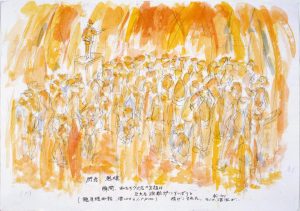My Life — Interview with Hiromu Morishita (1930–), A-bomb survivor and teacher, Part 4: A-bomb explosion
Apr. 22, 2024
Heat like being inside blast furnace
August 6, 1945, was a Monday. Just a few days before, I was diagnosed with beriberi by my physician, who gave me a medical certificate instructing me to rest for one week. However, my father told me to go to school at the beginning of the next week and inform the teachers that I would be absent from school starting the next day. I was upset at what he said, but it turned out to have been a good thing. If I had stayed home, I might have been crushed to death under our collapsed house. Alongside my mother.
That day, my mother saw me off as I left home reluctantly. She looked at me for a long time through the lattice door of the room next to the entrance to our home with her face expressing pity. I clearly remember that scene to this day.
The worksite was at the west end of Tsurumi Bridge, located in the city’s Naka Ward, around 1.5 kilometers from the hypocenter. About 70 classmates had gathered there.
I boarded the train at Yokogawa Station (located in the city’s Nishi Ward). I actually forgot about my building demolition work and starting going in the direction of Toyo Kogyo (present-day Mazda Motor Corporation, located in the area of Fuchu-cho in Hiroshima Prefecture). When the train I was riding temporarily stopped in response to a warning siren, I recalled that I had to head toward the center of the city. I hurried and got off the train at Hiroshima Station (in the city’s Minami Ward) and walked to the site with my classmates who happened to be there at the time. The sun was shining brightly, and we were all remarking about how we wanted to go for a swim.
The atomic bomb exploded just as we were all lining up to receive words of caution about our work. Suddenly, the world turned bright red. It felt like as if I had been thrown into a huge blast furnace. In that instant, I suffered burns on my face and limbs. Then, there was the blast. I believe I immediately threw myself to the ground, but I might have also been knocked to the ground and lost consciousness.
It was so hot. As if led by the people around me, I headed toward the river. I don’t remember whether I got into the water or sat on the riverbank. What I do remember is hearing people groaning in a way that sounded like the buzzing of a swarm of mosquitoes. The sun had disappeared, and it was as pitch black as the sky in winter.
And then, one of my friends called out to me, asking, “What’s wrong with my face?” I replied something like, “Your skin is peeled off and hanging down.” My appearance was probably similar, but I wasn’t calm enough to think about myself. I was not in any pain, either.
After a while, I fled to Hijiyama Hill, following throngs of people. When I climbed up the cliffs, got to the top of a hill, and looked out over the city, I found that the entire town had been destroyed. I could only stare in a state of shock as I saw flames quickly rising up here and there.
(Originally published on April 22, 2022)








